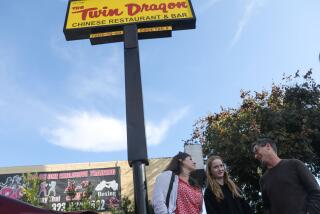Flame of Tradition Still Burns Brightly : Greek-Americans: Rituals from the old country continue, and the schedule is busy.
As her neighbors in Downey are popping champagne corks to celebrate New Year’s Eve tonight, Angelic Zaferis will be popping loaves of bread into the oven.
She won’t be cooking any last-minute hors d’oeuvres, though. It will be special bread made from flour, eggs, imported gum--and 25-cent pieces.
Zaferis will be preparing a special Greek bread called vasilopita that Greek-Americans eat each Jan. 1 to start off the new year on the right foot.
The sweet bread is not only tasty, it’s also lucky--particularly if you’re the one who finds a hidden quarter baked into it.
“The quarters are washed. And wrapped in aluminum foil,” said Zaferis with a laugh. A third-generation Greek-American, she plans to prepare half a dozen loaves of vasilopita for family members and friends to eat on Wednesday.
“If you get the coin, you’ll have good luck all year long.”
The bread honors St. Basil, a 5th-Century founder of the Greek Orthodox Church who is said to have been martyred on Jan. 1. It is part of a tradition hundreds of years old.
The eating of “St. Basil’s Cake” comes at the halfway point of a holiday season that started with a fast before Christmas and will end in mid-January for the estimated 100,000 Greek-Americans living in the Los Angeles area.
In addition to Christmas and New Year’s, they celebrate the St. Basil’s feast on Jan. 1, a blessing of churchgoers on Jan. 5 and a ritual known as the blessing of the waters on Jan. 6. During the week after that, priests visit individual homes to bless families.
Because Jan. 6 falls on a workday this year, the water-blessing ceremony will take place on Sunday, Jan. 12, in Long Beach. Bishop Anthony, the San Francisco-based head of the Greek Orthodox Church for the western United States, will officiate by tossing a cross into the ocean.
Greek-American families take bottles of holy water home from church that day to keep and use throughout the year, said Rev. James T. Adams, dean of St. Sophia Greek Orthodox Cathedral in Los Angeles.
“It’s a very busy time,” Adams said. “Surprisingly, second- and third-generation Greeks maintain the customs brought by their parents and grandparents.”
It is something that many of Greek descent do gladly, said Nicholas Royce, a North Hollywood film distribution executive.
“It’s not really that tough. We’ve assimilated, but we’ve held firm to the teachings of the first eight centuries,” Royce said. “We’ve had a rich history and culture. We gave light to the world. We’ve kept the flame for ourselves.”
Zaferis, an accountant, said each Greek-American family has its own favorite recipe for vasilopita . Hers includes a natural gum brought from Greece. The masticha gives her bread a chewy quality.
But there’s an even more special St. Basil’s Cake that will be sliced on New Year’s Day, according to Zaferis’ brother, Demetrious, a space shuttle control system engineer who also lives in Downey.
It’s the bread baked by Greek-Americans known as Constantinopolitans who trace their roots to Istanbul, he said.
“They put actual gold coins in their bread. Not quarters.”
More to Read
Eat your way across L.A.
Get our weekly Tasting Notes newsletter for reviews, news and more.
You may occasionally receive promotional content from the Los Angeles Times.











